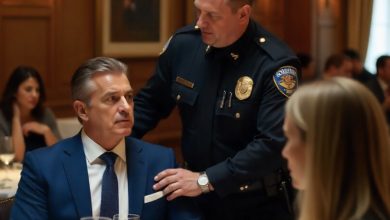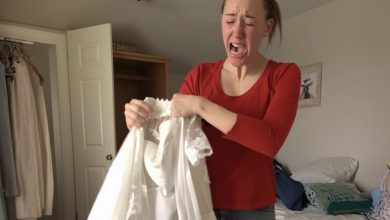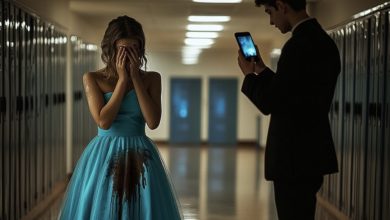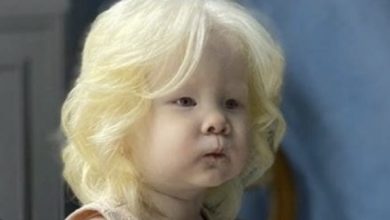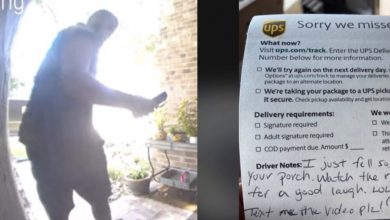She Hit My Daughter At The Family Table But My Son’s Words Made Everyone Freeze
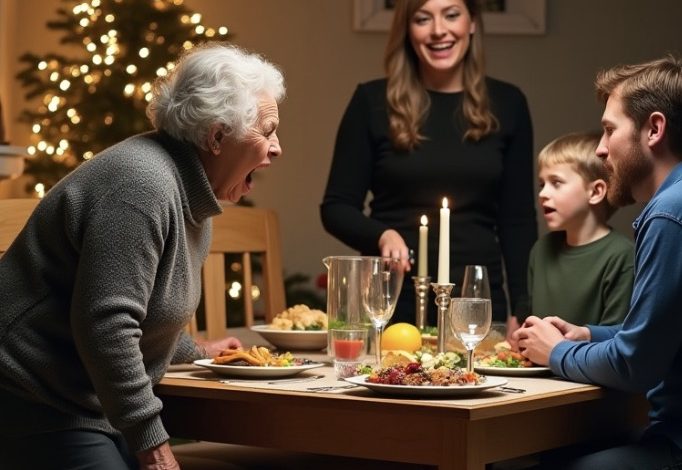
The chandeliers above the Whitmore dining room sparkled like glass icicles, casting shifting light over the long polished table and the paintings that lined the walls. Everything was picture perfect — the kind of Christmas scene that looked like it belonged on the cover of a magazine. But looks can lie, and that house had always been built on lies.
I should have known better than to bring my children to the Whitmore Christmas dinner. Something deep inside me had warned me it would end badly. But every year, my husband, Grant, promised me it would be different. Every year, I believed him.
This time, I didn’t have that luxury again.
“Mommy, can I help with the drinks?” asked Lily, my four-year-old daughter, her eyes bright and hopeful. She was wearing the little red velvet dress I’d saved months to buy. I had tied ribbons in her hair that morning, and she looked like a tiny Christmas angel.
I smiled gently. “Maybe wait until you’re a little older, sweetheart.”
But Constance, my mother-in-law, was watching from across the room like a hawk, barking orders at the catering staff. She ran her home like a military operation, and children were clearly not part of her perfect plan.
“Please, Mommy,” Lily said again. “I want to show Grandma I can help.”
Before I could stop her, she reached for the glass pitcher. It wobbled in her small hands as she lifted it carefully. Across the room, Grant was laughing at something his father, Bernard, had just said. He didn’t notice our daughter struggling.
Lily took three steps, concentrating so hard her little tongue poked out between her teeth. Then her shoe caught on the edge of the Persian rug. The pitcher slipped. Water splashed everywhere — over the table, onto the floor, and across one of Constance’s precious chairs.
The sound echoed through the room like a crash of thunder. Conversations stopped mid-sentence. Forks froze in midair.
“Oh no,” Lily whispered, her eyes filling with tears.
Then it happened — faster than I could even process.
Constance moved across the room like lightning, her heels striking the floor like gunfire. Before I could even speak, her hand cracked across Lily’s cheek with a sound that made my stomach twist.
“You clumsy little brat!” she screamed.
Lily stumbled backward, one small hand pressed to her face, crying in confusion and pain.
“Constance!” I gasped, rushing forward, but the woman was already gripping my daughter’s hair, dragging her toward the table. There was another sharp sound — the corner of the table catching Lily’s forehead.
Blood appeared almost instantly.
That was when I finally broke out of my shock. I shoved past the other guests and dropped to my knees beside my little girl. “Lily!” I cried, lifting her into my arms. “Oh my God.”
Her tiny body shook as sobs escaped her. Blood streaked through her hair and onto my sleeve. My chest felt like it was being crushed.
Then, behind me, Grant’s voice came — not horrified, not angry, but laughing.
He actually laughed.
“Mom’s right,” he said, forcing a chuckle that sounded more like an apology to his parents than anything else. “She needs to learn to be careful.”
I stared at him, disbelief freezing me in place.
“You’re joking,” I whispered. “Your mother just hit her.”
Constance straightened her sweater, her voice icy. “Children need discipline. Better she learns that now before she turns out like her mother.”
The guests — uncles, aunts, cousins — turned their eyes away. Forks scraped against plates again. No one moved. No one spoke. The Whitmores had decided to pretend nothing had happened.
I held Lily tighter, whispering against her hair, “You’re safe, baby. I’ve got you.” My voice trembled, but I needed her to hear calm. Inside, I was pure fire.
And then, from across the room, came another sound. A chair sliding back.
Nathan, my seven-year-old son, stood up.
He was small for his age, but in that moment, he seemed taller than everyone in that room. His brown eyes were serious, and his voice — soft but firm — broke through the false calm like a hammer through glass.
“What Grandma did was wrong,” he said.
“Sit down, Nathan,” Grant snapped. His face was red, not with shame, but with embarrassment.
“No.” Nathan shook his head, stepping forward. “You shouldn’t hurt people, Grandma. Not ever.”
Constance’s lips tightened. “You don’t tell me what to do, young man.”
Nathan pointed at her, his little hand trembling slightly but steady in intent. “I know what you did,” he said. “I know about the accident.”
The air seemed to leave the room.
Constance’s face went pale. Bernard’s fork slipped from his hand and hit the table with a sharp clink. A few guests exchanged nervous looks, but most just froze, caught between disbelief and dread.
Grant blinked at our son. “What are you talking about?”
Nathan’s voice didn’t shake. “I heard Grandma and Grandpa talking last summer when you thought I was asleep. You were in the study, and the door was open. You said Aunt Teresa didn’t fall down the stairs like everyone thinks. Grandma pushed her.”
Gasps rippled through the room. Someone whispered, “Oh my God.”
Constance gripped the back of a chair, her knuckles turning white. “You don’t know what you’re saying, child.”
“I do,” Nathan said. “You told Grandpa you had to protect the family name. You said nobody would believe Teresa because you made her look clumsy — just like you called Lily tonight.”
The words hung in the air like smoke.
Bernard stood so fast his chair toppled backward. “Enough! That’s enough!” he shouted. “This is nonsense. You’re upsetting everyone.”
But Nathan kept going. “Grandpa said he still thinks about it at night. You told him to stop talking because people might hear.”
Grant’s uncle, Kevin, rose from the far end of the table. “Wait a minute,” he said shakily. “Teresa was my sister. Are you saying she didn’t fall? Are you saying—?”
“Sit down, Kevin,” Bernard barked, but Kevin didn’t move.
Constance’s voice cracked as she tried to sound calm. “Children have wild imaginations.”
Nathan took a small step closer. His eyes glistened with tears, but his words were clear. “I’m not making it up. I heard it. You said, ‘She was going to ruin everything. I had to stop her.’”
Constance’s lips parted, but no sound came out. Her face had turned almost gray.
Around the table, guests were standing now. Whispering. Recording. The perfect Whitmore image was crumbling in real time.
I rose, holding Lily in my arms, and looked straight at my husband. “We’re leaving,” I said.
“You’re overreacting,” Grant muttered weakly.
I stared him down. “Your mother hit our daughter. Your father’s covering for her. Your son just accused them of murder — and you’re worried about overreacting?” My voice was shaking, but I didn’t care. “You can come with us, or you can stay here with them. But if you stay, you’ll never see me or the kids again.”
Grant hesitated. His mother’s eyes burned into him, demanding obedience. But then Nathan slipped his small hand into his father’s. “Let’s go, Dad,” he said quietly. “Before Grandma hurts someone else.”
That did it.
Grant grabbed his coat without looking at his parents.
Bernard’s voice thundered as we reached the door. “If you walk out that door, you’re finished! No trust fund, no company, no name!”
“Good,” I said coldly. “We don’t want anything that comes from hurting people.”
Behind us, Kevin was already on his phone, calling the police. I caught one last glimpse of Constance sinking into a chair, her face buried in her hands.
Outside, the cold December wind hit like a wall. Nathan climbed into the car silently while I buckled Lily in, her cheek still swollen, her eyes red. “Where are we going, Mommy?” she whispered.
“Somewhere safe,” I said.
We drove to the hospital. The doctor took one look at Lily’s injuries and called in a social worker. Photos were taken. Questions asked. My story poured out like water finally breaking through a dam.
When the police arrived, the older officer listened carefully as I explained everything — including what Nathan had said about Teresa. “We’ll need to talk to your son,” he said. “If what he heard is true, it could reopen an old case.”
I nodded. “Whatever it takes.”
By morning, news had already reached the press. The Whitmore family scandal spread fast — too fast for them to contain it. A few days later, the police confirmed they were reopening the investigation into Teresa Whitmore’s death, once ruled an accident.
Detective Marcus Flynn, a quiet man with sharp eyes, interviewed Nathan in our living room a few days later. “Can you tell me exactly what you heard that day?” he asked gently.
Nathan took a deep breath. “Grandpa said, ‘I keep thinking about Teresa. What if someone finds out?’ And Grandma said, ‘Nobody’s going to ask questions after all these years.’ Then she said Teresa was going to destroy everything with her big mouth. She said she couldn’t let her do that.”
Flynn’s pen moved slowly across his notepad. “You did very well, Nathan,” he said. “You were very brave to tell the truth.”
Over the next few weeks, everything happened quickly.
Constance and Bernard were questioned. A retired medical examiner admitted she’d been pressured to mark Teresa’s death accidental. Financial documents emerged showing years of fraud in Bernard’s company. A former employee came forward, saying Teresa had discovered the embezzlement and planned to expose it.
Two weeks later, the police returned to the Whitmore estate with a warrant. Constance and Bernard were arrested.
The media exploded. Reporters camped outside our building. Grant’s extended family turned against his parents, horrified. For the first time in years, Grant looked like he was seeing his family for who they really were.
He came to see me a few days later. His face was lined, his eyes red. “I’m sorry,” he said simply. “You were right about them. I just didn’t want to believe it.”
I nodded but didn’t answer. Some wounds run too deep for easy forgiveness.
The trial that followed was brutal. The truth about Teresa finally came out. Witnesses testified. The jury listened.
When the verdict was read — guilty on all counts — Constance showed no emotion. Bernard took a plea deal and would spend the rest of his life in prison. Their empire collapsed overnight.
Lily healed slowly. The bruise faded, the cut on her forehead became a faint scar, but the fear took longer to disappear. Nathan grew quiet for a while, guilt gnawing at him.
“You didn’t ruin anything,” I told him one night. “You saved your sister. You did what the adults were too afraid to do.”
He nodded but didn’t speak. His small hand found mine. “Will Grandma ever come back?”
“No,” I said gently. “And that’s a good thing.”
Months passed. We moved to a smaller city, where nobody knew our names. I found a new job. The kids started at new schools. Life became quiet — ordinary, peaceful.
We still celebrate Christmas, but now it’s just the three of us. No chandeliers, no fine china, no fake smiles. Just cookies, laughter, and love.
Sometimes I look at Nathan and Lily and think about how everything changed because of one brave child who refused to stay silent.
He may have been only seven years old, but that night, Nathan taught an entire family what truth really means — and saved us all from living under the shadow of people who mistook cruelty for strength.
And every Christmas since, as snow falls outside our window, I whisper a silent thank you to my son — the little boy who stood up and made the whole room finally fall silent.





